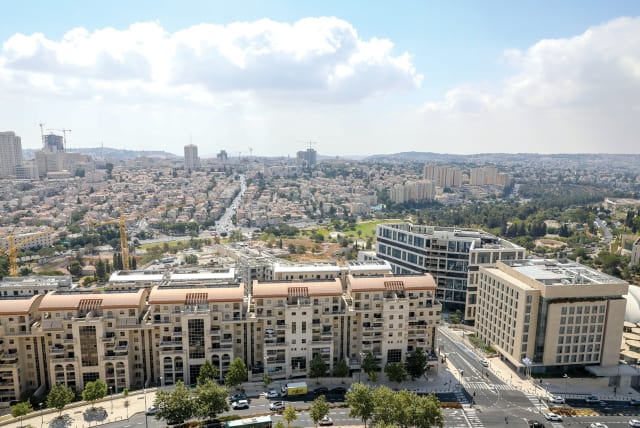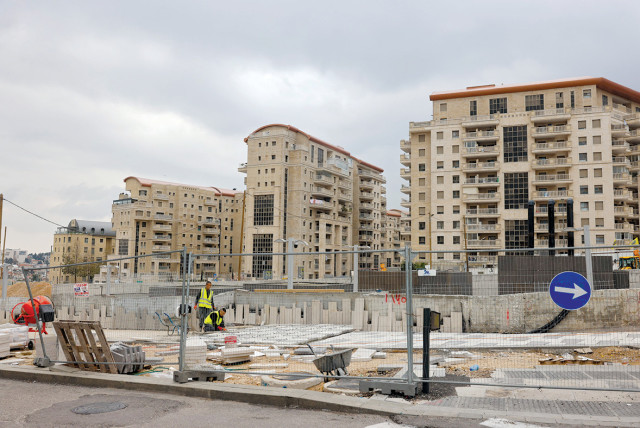Mishkenot Ha’uma: A new center of national and urban sophistication

NEIGHBORHOOD CORNER: Mishkenot Ha’uma is a forward-looking neighborhood and a statement of Jerusalem’s intentions to grow and modernize as an international city.

One of Jerusalem’s newest neighborhoods, Mishkenot Ha’uma, sits on the former Foreign Ministry complex close to the western entrance of Jerusalem.
Characterized by sleek modern architecture and a palpable air of political and national significance, this neighborhood was established primarily to house the renewed government offices and institutions in its proximity. With close to 700 modern and spacious units, including deluxe penthouses, covering almost 50 acres, Mishkenot Ha’uma was finally completed in the mid-2010s and is a forward-looking neighborhood and a statement of Jerusalem’s intentions to grow and modernize as an international city.
Hub for national institutions
The area of Mishkenot Ha’uma also contains Kiryat HaLe’om (the National Quarter), the official name of the complex that includes Kiryat HaMemshala (the Government Quarter) and Binyenei Ha’uma (the International Convention Center, ICC). The plan is to include most government and national institutions, such as the Bank of Israel, the Bloomfield Museum of Science, the Interior Ministry, the Finance Ministry, the Prime Minister’s Office, the Supreme Court, and the National Library.
Future buildings will also be home to the National Archives and the National Gallery, as well as the national headquarters of the Israel Police and the State Comptroller offices.
Growing neighborhood
Mishkenot Ha’uma’s population is a mix of young and old, ultra-Orthodox and non-religious, and it houses foreign diplomats and dignitaries, as well as young Israeli families. While the neighborhood may lack some of the amenities that other more established areas of Jerusalem contain, it manages to provide for its residents.
“Over the years, the neighborhood has become like a little city of its own,” local resident Keshet told In Jerusalem. “It has a café, two supermarkets, doctors’, dentists’, and other offices. There’s also an underground parking lot for cars.
“What’s special about Mishkenot Ha’uma is that most Jerusalem apartments in such a great location tend to be old and run down, but these buildings are new and modern.”
Convenience in every direction
What Mishkenot Ha’uma lacks in terms of history, it makes up for in location. Situated between the Government Quarter and bordering Givat Ram and Nahlaot, the neighborhood is a short walk away from Cinema City and the huge Sacher Park. Just a little farther down the road is the city’s famous Mahaneh Yehuda market with its bustling stalls, and the city center.
In the other direction, Mishkenot Ha’uma is situated right next to the new Yitzhak Navon train station, the Central Bus Station, and Highway 1 leading to Tel Aviv.
“I’ve been living in Mishkenot Ha’uma for the past three years,” Keshet said. “In my opinion, the location is one of its best features. It’s close to everything in Jerusalem’s center, and two minutes away from the Central Bus Station, the light rail, and the intercity train station, making it incredibly easy to get anywhere in the city and the country.”
In the ever-evolving mosaic that is Jerusalem’s neighborhoods, Mishkenot Ha’uma serves as a symbol of the urban sophistication of Jerusalem’s future and what Israel’s capital wants to be known for, alongside the city’s rich history. ■
Est. Population:
- 3,000
Avg. Real Estate:
- Home (buy) – NIS 4.2 million
- Apt. (rent) – NIS 9,000/mo.
Jerusalem Post Store
`; document.getElementById("linkPremium").innerHTML = cont; var divWithLink = document.getElementById("premium-link"); if (divWithLink !== null && divWithLink !== 'undefined') { divWithLink.style.border = "solid 1px #cb0f3e"; divWithLink.style.textAlign = "center"; divWithLink.style.marginBottom = "15px"; divWithLink.style.marginTop = "15px"; divWithLink.style.width = "100%"; divWithLink.style.backgroundColor = "#122952"; divWithLink.style.color = "#ffffff"; divWithLink.style.lineHeight = "1.5"; } } (function (v, i) { });


